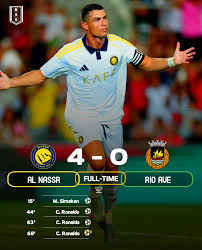Exploring Al Nassr: A Leading Force in Saudi Football

Introduction
Al Nassr Football Club, based in Riyadh, Saudi Arabia, has risen to prominence in recent years, becoming a significant player in both Asian and world football. Founded in 1955, Al Nassr boasts a rich history and has cultivated a passionate fanbase that follows the team’s exploits both domestically and internationally. Their recent successes further underline the club’s importance in the sporting landscape of the Middle East and beyond.
Recent Achievements and Significance
Al Nassr has established itself as one of the most successful clubs in the Saudi Pro League, having won multiple league titles, cup competitions, and showcasing a strong presence in Asian tournaments. In 2020, the club celebrated its 65th anniversary with a rich legacy of achievements, including several King’s Cups, Crown Prince Cups, and the prestigious AFC Champions League title.
The club went through a transformational phase when it signed high-profile players, such as Portuguese superstar Cristiano Ronaldo in late 2022. This move not only heightened the club’s visibility on a global scale but also attracted seasoned players and coaches from various parts of the world, fostering greater competition in the league.
The Impact of International Players
Al Nassr’s strategy of incorporating international talent has yielded significant benefits. With Ronaldo leading the charge, the club has gained substantial media attention, boosting its brand and commercial prospects. The influx of international stars has also raised the overall quality of play within the Saudi Pro League, drawing more viewers and enhancing the league’s reputation.
In addition to Ronaldo, Al Nassr has signed other notable names, contributing to a more competitive environment that can compete with teams in Europe and Asia. This strategy is indicative of a broader trend in Middle Eastern football, where clubs are keen to invest in international talent to achieve success.
Looking Ahead
As Al Nassr continues to ambition for success, both domestically and in Asian competitions, the club’s management has set clear goals for the future. With increasing investments in player development, infrastructure, and facilities, Al Nassr aims to solidify its standing as a powerhouse in world football.
In conclusion, Al Nassr Football Club not only represents the rich culture and passion for football in Saudi Arabia but is also poised to continue its trajectory of growth and international recognition. Fans and analysts alike will be observing closely how the club leverages its recent successes to build a sustainable future in competitive football.









